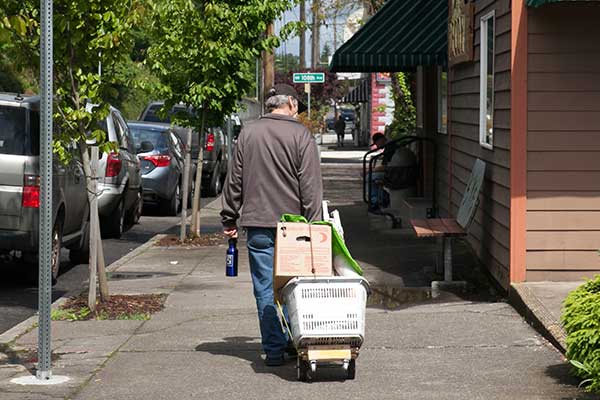The intricate link between housing and hunger – By David Sarasohn
The intricate link between housing and hunger – By David Sarasohn
February 20, 2018 – Being homeless, Mecca Alexander explains earnestly, doesn’t mean you don’t eat. In eight years on Portland’s streets, he learned all the places that provide food – and also that he had no control over his eating.
“Time never moves slower,” he remembers, “than when you miss breakfast on the street, and have to wait for lunch.”
Lately, Oregon cuisine has produced national awards, critical enthusiasm and a shelf of cookbooks, but there’s another key principle that shapes local dining.
How you eat depends a lot on where you sleep.
This is especially true in a place with a housing crisis, and homeless tents spreading along its roads like plastic dandelions. In Oregon, you can’t talk hunger without talking housing.
And in Oregon, housing is a bleak subject.
In his early 30s, Mecca’s family situation came apart – he says it was like having his legs knocked from under him – and he wound up sleeping under the Steel Bridge. He’s a large figure, which probably provided some protection, and he carries a gentleness that probably provided some more.
Nearly dying saved his life. Extreme congestive heart failure sent him to OHSU hospital, and after two weeks of treatment he was released to Central City Concern, which found him housing. Now he lives off the streets and volunteers full time, including two days a week at Oregon Food Bank. Even when he was on the street, he knew the places that fed him, like Blanchet House, were largely supplied by Oregon Food Bank.
But if there are places to go to eat, there are more places where you can’t go, either to eat or to try to work your way off the streets. “You don’t have a place where you could clean up,” Mecca says. “A business doesn’t want you coming in unwashed. You can’t show up at a Subway shop, or a McDonald’s, dirty.”

And while you can eat on the streets, you can’t cook. There’s no kitchen in a tent, or on a piece of cardboard. It’s a challenge for people living on the streets – and also for people assembling emergency food boxes.
“You give out carrots or apples, as opposed to a potato,” explains Anneliese Koehler, a policy advocate for Oregon Food Bank. “Tuna fish and mayonnaise might work – if they have a can opener.”
The housing-hunger pipeline doesn’t stop at street people. A key reason that Oregon has spent decades high up in the national hunger rankings is that housing costs have been rising so much faster than wages. A recent Oregon Food Bank survey of people who use food pantries found that the top cause of their need was low income, with high housing costs close behind.
In the latest U.S. Department of Agriculture report, Oregon was the only state where hunger had gotten perceptibly worse. “The rapid rise of rental costs in the Portland Metro area, and in other places in Oregon that are included in the USDA survey,” assessed Oregon State sociology professor Mark Edwards, “could be a driving force in the jump in food insecurity.”
In a tight family budget, rent and car insurance won’t budge; bread can be squeezed. “Food is the most elastic of basic needs,” says Koehler. “What’s the part that gives the most? It’s food.”
Oregon officials at all levels have tried to deal with the housing crisis. One way to produce some money to deal with it, supported by Oregon Food Bank in the legislature, is to increase the document fee for real estate purchases, from $20 to maybe $75. In an Oregon real estate market that starts at several hundred thousand dollars and shoots upward, the increase might barely be noticed, but it would provide about $100 million over two years to help with the housing crunch – and with homelessness.
The battle against Oregon hunger is waged with pantry staples and fresh produce, with hot meals provided to people who sleep far from a kitchen. But in a place where housing costs crowd out food, and where too many people are crowded out of housing, supporting the hungry takes more than just feeding them.
Every week, riding the bus up to volunteer in the food bank loading dock or the sorting room, Mecca remembers living on the streets.
“When you have housing, when you live inside, you can plan,” he explains. “On the streets, you live day by day. On the streets, you start to feel like you’re nobody. You see everybody else doing stuff, and life is passing you by.”
Actually, you don’t have to be homeless to feel that way.
You can just be hungry.
